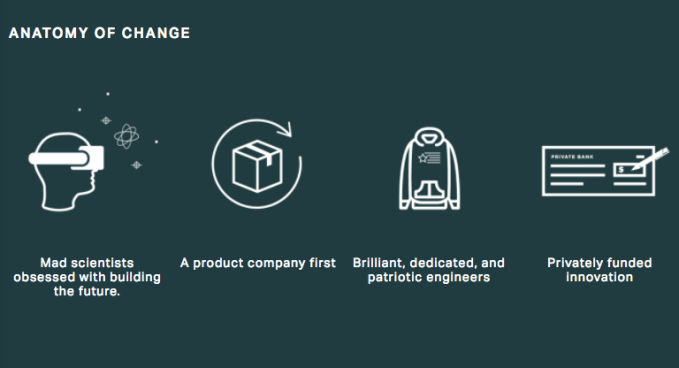Palmer Luckey’s new defense startup Anduril has aspirations well beyond a high-tech border wall. According to new information on the company’s website and its hires, Anduril intends to apply its virtual reality pedigree to “real-time battlefield awareness for soldiers,” among other defense-centric specialties.
As California records show, the company was incorporated in June of this year and is based out of Irvine, the former headquarters of Oculus prior to its move to Facebook’s home in Menlo Park. Following months of controversy, Luckey left the VR company he co-founded in March of this year.
It’s not yet clear what role Luckey will play at Anduril, but now we know more about the team. LinkedIn lists former Palantir engineer Matt Grimm, former Oculus producer and product lead Joseph Chen and Founders Fund partner and former Palantir engineer Trae Stephens as Anduril’s co-founders.
Former Oculus engineer Torin Herndon is also listed as an Anduril engineer, joining the company in September. Former Palantir director Brian W. Schimpf was listed as Anduril’s chief executive officer in June.

Anduril’s advantages
Stephens in particular is well-positioned to vie for juicy government contracts: after being tapped by Founders Fund managing partner Peter Thiel, he played a role in the Trump administration, overseeing the Department of Defense transition. According to Politico, Stephens apparently ruffled some feathers at the Pentagon with questions about changing the Defense Department’s competitive procurement process through which it accepts bids and awards contracts.
Beyond Stephens, all of that Palantir talent makes perfect sense. Palantir is a natural model for Anduril’s defense aspirations. Potentially worth north of $20 billion, the often secretive company owns a huge array of data and surveillance-focused government contracts with everyone from the three-letter agencies to the NYPD.
Anduril’s vision
In August, Anduril only had a placeholder website with an info email address listed for inquiries. At the time, Anduril, Luckey and the Founders Fund did not respond to TechCrunch’s requests for comment on the company’s defense plans and work advising lawmakers on high-tech border wall proposals.
Now, the site is fleshed out significantly, with a logo and something resembling a mission statement, if not a raison d’être. Declaring that defense innovation has lagged since the Cold War, Anduril reveals some of its specific aims:
Anduril is privately funding and building products that America and her allies desperately need: real-time battlefield awareness for soldiers on the ground and headquarters alike, technology that keeps our men and women on the front line out of harm’s way, and a host of other technologies that will ensure we are staying ahead of our adversaries.
Anduril’s assertion that it is a “product-focused” company combined with the fledgling team’s collective experience, split between VR and Palantir’s more data and surveillance-oriented products, a picture of what Luckey’s new project is really up to emerges. Playing up that remaining interest in AR and VR, an illustration depicts an individual wearing a headset not unlike Oculus’s own offerings.

As one source who has spoken with the company’s founders told TechCrunch, Luckey’s vision seems focused on applying augmented reality to defense. Given the sophistication of even the mass-produced consumer-grade virtual reality headsets that Luckey pioneered, it’s easy to imagine how affordable AR and VR could be standard issue in a near-future for the U.S. military.
Anduril’s other areas of focus include computer vision, sensor fusion, distributed computing infrastructure, optics and camera systems, LIDAR and RADAR systems, robotics, automation and aeronautical design, according to a job posting that TechCrunch reported in July.
For soldiers in combat, AR could offer vital real-time information — or “battlefield awareness” — with the kind of heads-up displays that are ubiquitous in military video games to show ammunition, weapon selection and target information. Off the battlefield, affordable, readily available virtual reality devices could allow for everything from lifelike mission simulation to drone targeting.
Some of this is well underway, of course. Just this summer, U.S. Navy gunnery sailors tested augmented reality headsets for battle purposes. “The headset is wirelessly connected to a tablet, which the officer uses to direct the gunner’s attention toward targets, and to start or stop firing,” Defense One reported. “Cues and other information — infrared imagery, distances to targets — appear in a heads-up display projected on the visor.” The Office of Naval Research has been digging into consumer VR since 2015 in its Battlespace Exploitation of Mixed Reality (BEMR) lab, depicted above in the header image, and similar projects are in development in other wings of the U.S. military.
Near and far future aims
The difference between Anduril and existing military projects is that the company is guided by the man who made it his singular mission to bring virtual reality devices to the mainstream, making them both affordable and consumer-friendly. It’s hard not to think of Luckey’s Oculus efforts when Anduril’s site asserts that the company “funds and builds our own technology” and criticizes the “slow and expensive development of bespoke technology” that slows down defense innovation.
Brain-computer interfaces could be another big opportunity for Anduril and other private tech defense contractors. Earlier this year in an interview with MoguraVR Luckey shared his own thoughts about devices that could provide a direct link between the human brain and the devices we control:
Competition is about to start with this technology. A lot of people will compete to make a BCI [Brain-Computer Interface] that will allow people to move virtual objects with just your brain. BCI devices that currently are available to consumers are not in a usable state. The BCI devices in laboratories are very different. If someone could make a general BCI device they could sell… the world would change.
When asked about his current projects, Luckey added:
“I can’t say anything at the moment. The only thing I can say is that I am trying to once more change VR.”
Update: Luckey reached out to TechCrunch to clarify that his interview with MoguraVR was translated from English to Japanese and back to English, losing parts of his original wording in the process. He noted that the quotes were “close to correct” but not exact.































Comment